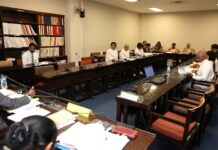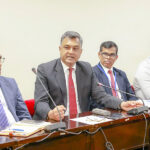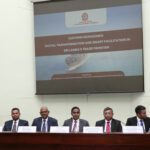State Minister of Money and Capital Market and State Enterprise Reforms, Ajith Nivard Cabraal said, “Even after the recent fuel price hike, our petroleum prices are far lower than those of countries in the region particularly India, Pakistan and Bangladesh. The per capita income of those countries is half of ours, as such the burden on our consumers is far less than the burden in those countries”.
“No Government likes to increase the prices of any commodity. However, if the cost price of a commodity is higher than the selling price, no business or institution can continue. We have to ensure that these are dealt within a rational manner,” the State Minister yesterday, June 19.
He also said that the current international prices of petroleum products are much higher than the price at which the Ceylon Petroleum Corporation (CPC) sells it. Therefore, the CPC has incurred a loss of nearly Rs. 45 billion this year alone. Over the past so many years, the CPC has been making huge losses due to this same problem. At present, the losses have led to nearly Rs. 650 billion being payable to State banks.
State Minister Cabraal also stated, “If we continue this trend, the State banks will also be destabilised. Therefore, we have to take a decision as a responsible Government to ensure that these institutions are protected. We are giving oil at a reasonable price so that the structural ability of this operation is assured. That is why we have to increase fuel prices”.
State Minister also said if these institutions crash or suffer, then the Sri Lankan consumer will be the biggest loser. “Therefore, we have to take an overall decision on the economy to protect the banks and the exchange rates to see that Sri Lanka is sustainable and ensure that Sri Lanka’s business cycle can continue. Therefore, we request the people to understand the circumstances behind the recent fuel price hike.”
State Minister also said during the past 18 to 20 months, the Government held back the decision to increase fuel prices as much as possible. “However, it has come to a stage where if we don’t take this decision right now, we will be compelled to take other measures which could be even more drastic. We have taken this decision to prevent such a situation.”
He said former Finance Minister Mangala Samaraweera had a different method to increase fuel prices. They were not sensitive at all and they were focusing only on international prices. If international prices went up, they would have to increase the local fuel prices. “In our case, we examine the possibility of not increasing fuel prices for a long period. But when it became inevitable, we had to do it. I think the people will realise this decision has been taken in the interest of the entire economy in the short, medium and long term.”
The State Minister said the Government has examined all aspects. “These changes are at the minimum that we could afford to give. When these changes are made, some adjustments of the prices might occur. Therefore, the fisheries sector might have to make an adjustment in their selling prices and improve productivity to ensure that they can absorb this. The bottom line is that these fuel prices are still much lower than the prices in other countries. That means our price structure is not unreasonable,” he said.












